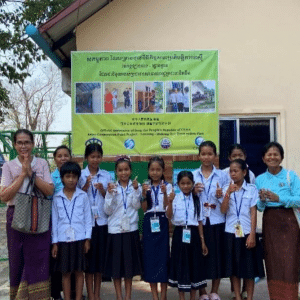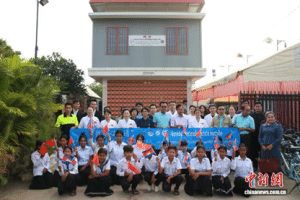The concept of “the third distribution” has encouraged businesses to take their social responsibilities more seriously and become involved in various charity projects.
Following the trend, Tencent has spent 100 million yuan ($15.8 million) to launch the “Enterprises and Social Organizations United for the Boom of Charity Work” program, which has seen the tech giant collaborate with other companies as well as some charities to help cultivate a public welfare community.
During Chinese New Year, around 50 companies joined the program including Li-Ning, Fengchao, Tongcheng Travel and Yum China to launch “a good deed as a good start to the new year” — a series of public welfare projects that are easy for people to participate in.
The internet has been a useful tool for the corporate sector as firms try to connect with customers, employees and other stakeholders — and it has enabled companies to be more creative when launching their charity projects.
In 2021, Tencent decided to increase investment in its famous 99 Charity Day, putting in a total of 1 billion yuan: 600 million yuan to support the operation of various charitable initiatives, and 400 million yuan to support the development of high quality public welfare programs. Tencent’s financial contribution included 100 million yuan designated for the “Boom of Charity Work” program, which financially supports charity projects operated by businesses and social organizations.
The program emphasizes the launching of new projects to encourage the public to easily contribute to the public welfare sector through their day-to-day internet activities.
For example, Yum China and the China Foundation for Poverty Alleviation launched the “Nutrition with Yum China” campaign, which involved some of the company’s biggest brands including KFC, Pizza Hut, Little Sheep hot pot, and Huang Jihuang encouraging their customers to participate by scanning a QR code on their receipts. After scanning the code, the customer’s steps are recorded and can later be “donated” to buy meals for children living in rural areas, with the funding provided by Yum China and the China Foundation for Poverty Alleviation. In addition, the pair also match users’ donations to the “Donate One Yuan” charity project to improve the quality of food served to rural children.
Companies including Fengchao and Li-Ning also partnered with charity foundations for their own “step campaigns”, encouraging their customers to donate their recorded daily steps.
“Only when good deeds are recorded and disseminated do users get a sense of achievement and the emotional motivation to continue taking part in charity projects,” a Tencent Philanthropy representative told the China Philanthropy Times.
Public participation has become an important part of modern philanthropy. With the largest ever number of internet users, the nature of modern internet activity can potentially turn social issues into extremely diverse public welfare projects, allowing ordinary people to easily participate – such as by donating steps, planting trees, and holding meetings. This greatly reduces the threshold for participation in public welfare and allows the public to integrate charity work into their daily lives.
The development of online public welfare projects in China in recent years has allowed the integration of public welfare into people’s lives and reshaped their daily routines. These projects demonstrate the advantages of internet charity work in terms of their convenience, transparency, feedback, and sustainability, according to the China Philanthropy Times.
The “Enterprises and Social Organizations United for the Boom of Charity Work” program is a new attempt to encourage a more innovative public welfare model in the digital era, with a tech giant joining forces with other companies, social organizations and public welfare institutions to engage a large number of users – for whom giving to charity will become an increasingly regular habit.



